Select Language
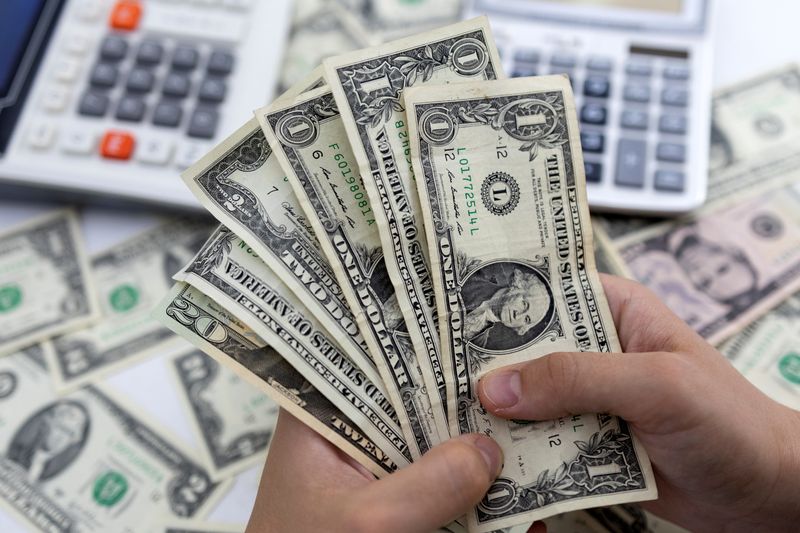
By Kevin Buckland
TOKYO (Reuters) -The dollar traded near a one-week high versus major peers on Friday, on track to snap a five-week losing streak, after robust economic data pared bets for aggressive Federal Reserve interest rate cuts.
The euro languished close to a two-week low to the dollar as cooling inflation in Germany and Spain boosted the case for European Central Bank easing.
The yen held near the closely watched 145 per dollar level after weakening on Thursday, as the greenback tracked a rise in U.S. Treasury yields.
The Japanese currency largely ignored data on Friday showing core consumer prices in Tokyo climbing at a faster-than-expected 2.4% in August, again topping the Bank of Japan's 2% target, although a measure that also strips out energy costs rose by just 1.6%.
Overnight, U.S. data showed gross domestic product (GDP) grew a 3.0% annualised rate in the second quarter, an upward revision from the 2.8% rate reported last month. Economists polled by Reuters had forecast GDP would be unrevised.
"That's been the market mover from the price action overnight, particularly when you look at currencies and U.S. Treasury yields," said Rodrigo Catril, senior FX strategist at National Australia Bank (OTC:NABZY), referring to the GDP reading.
"The takeaway there - the highlight - is that the consumer was stronger than had previously been thought," he added. "The exceptionalism of the U.S. was still evident in Q2."
Traders now more strongly favour a quarter-point Fed rate reduction on Sept. 18, laying only 34% odds of a 50-basis point (bp) cut, down from 38% a day earlier, according to the CME Group's (NASDAQ:CME) FedWatch Tool.
The U.S. dollar index - which measures the currency against a basket of six major peers - was little changed at 101.40 as of 0505 GMT, after rising 0.36% on Thursday and touching the highest since Aug. 22 at 101.58.
It is on course for a 0.7% gain this week, which would be its best week since the start of April. Over August though, it is set for a drop of about 2.5%, which would be its worst month since November.
The dollar eased 0.13% to 144.80 yen, after rising as high as 145.55 overnight for the first time since Aug. 23.
The euro was flat at $1.10755 and dropped as low as $1.10555 on Thursday. Later in the day, more consumer inflation readings from around Europe are due, including France, Italy and the euro zone as a whole.
The United States also sees the release of the core personal consumption expenditures (PCE) price index, the Fed's preferred inflation gauge.
Sterling was steady at $1.3165 after dipping to $1.3146 overnight for the first time since Aug. 23.
The Australian and New Zealand dollars hung near their highest levels this year, with recent data pointing to less need for imminent rate cuts.
The Aussie rose slightly to $0.68015 after hitting the highest since Jan. 2 at $0.6824 a day earlier, as it continued to draw support from hotter-than-expected consumer price figures this week. The currency shrugged off an unexpected stagnation in retail sales data on Friday.
New Zealand's kiwi added 0.08% to $0.6262, after reaching $0.6298 on Thursday for the first time since Jan. 2. A survey of consumers on Friday showed a pick-up from deep lows in August, after business confidence surged to the highest in a decade, a survey showed the previous day.
China's yuan firmed to a two-month high on Friday, heading for its biggest monthly jump since November, amid growing corporate demand for the Chinese currency as expectations heighten for U.S. rate cuts.
Spot yuan strengthened as far as 7.0895 per dollar before last changing hands at 7.0913, on track for a rise of about 2% for August.
"In the short term, we cannot rule out the possibility of a 'stampede' for currency conversion" that could boost the yuan above 7.0 per dollar, China International Capital Corp (CICC) said in a note.
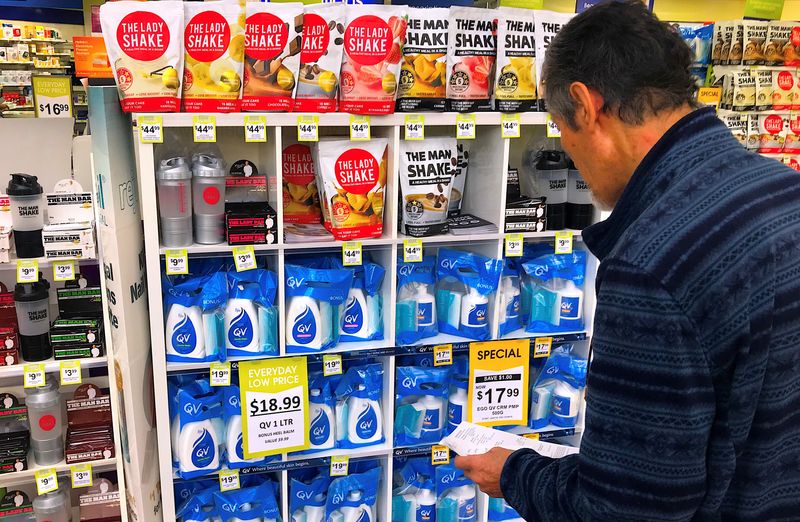
By Stella Qiu
SYDNEY (Reuters) -Australian retail sales were flat in July after two months of upbeat results, showing large-scale tax cuts were yet to boost spending and firming expectations the next move in interest rates will be down.
Data from the Australian Bureau of Statistics (ABS) on Friday showed retail sales were unchanged in July month-on-month, slowing from the 0.5% rise in June. Analysts had expected a 0.3% increase in July.
Sales rose 2.3% from a year earlier, slowing from previous month's 2.9% as consumers grappled with inflation and high mortgage rates. That was a weak result compared with the country's population growth of about 2.6%.
Spending on clothes and at department stores took a hit, down 0.6% and 0.5% month-on-month, respectively, in July, while cafes, restaurants and takeaway food all saw a drop of 0.2% as shoppers turned frugal.
Food retailing was the only category that saw an increase, up 0.2%. Indeed, Australian grocers Coles and Woolworths both posted decent profits.
"Overall, it's clear there was little momentum behind consumer spending at the start of the quarter. And while it is early days, the data broadly reinforce our view that Australian households are not rushing to spend their newfound tax cuts," said Abhijit Surya, Australia and New Zealand economist at Capital Economics.
"At the margin, the weakness in household consumption raises the risk that the RBA will cut rates before Q2 2025 as we're currently forecasting."
This weakness is the result of high interest rates with the Reserve Bank of Australia (RBA) raising rates by 425 basis points to 4.35% since May 2022 to tame inflation, which ran at 3.5% in July, above the bank's 2-3% target band.
Policymakers have ruled out a near-term rate cut, wary that consumption could pick up more than expected as real incomes turn positive thanks to the government's sweeping tax cuts in July, giving average wage earners an extra A$1,500 a year.
House prices have also been hitting record highs this year as a rush of migrants stretch limited supply, increasing the wealth of home owners.
Recent bank data on card transactions suggests July was sluggish, with Westpac observing consumers are mostly sitting on the extra cash from tax cuts rather than spending it and the third quarter would be likely another soft quarter.
Markets have been scaling back bets for a rate cut this year after July inflation slightly beat expectations. A first easing in December is no longer a done deal, with just a 80% probability.

By Ricardo Brito and Luana Maria Benedito
BRASILIA/SAO PAULO (Reuters) - Social media giant X said it expected Brazil's top court to order it to shut down late Thursday, as a pitched legal battle played out over compliance with local laws and owner Elon Musk's insistence the platform is being punished for resisting censorship.
The popular social media platform posted the announcement from its global affairs account, saying it expected Supreme Court Judge Alexandre de Moraes to order the shutdown "soon," moments after a court-imposed deadline passed.
Earlier on Thursday, the Supreme Court blocked the local bank accounts of billionaire Musk's Starlink satellite internet firm, in which he owns a 40% stake, while the underlying feud over X put it on the brink of being shuttered in one of its top markets.
The two firms are part of Musk's sprawling business empire which also includes rocket company SpaceX and electric car giant Tesla (NASDAQ:TSLA). The billionaire is the owner of X and the CEO of Tesla.
Starlink had previously confirmed it received an order from the judge that prevents the company from conducting financial transactions in Brazil.
In a Thursday night post on X, Musk lashed out at Moraes, decrying the ruling to block Starlink as illegal and that it would "improperly" punish other shareholders as well as ordinary Brazilians.
Signed by Moraes, the court's decision to sanction Starlink is a response to the lack of legal representatives in Brazil for X, a Supreme Court source told Reuters.
The decision to freeze Starlink's bank accounts also stems from a separate dispute over unpaid fines that X was ordered to pay due to its failure to turn over some documents. Local newspaper Folha has reported the fines total at least 20 million reais ($3.6 million), but Reuters was not able to confirm the amount.
The Supreme Court had set a deadline for X to name its legal representative in Brazil by shortly after 8:00 p.m. (2300 GMT) on Thursday.
At issue in the intensifying dispute is whether Moraes can order X to block certain accounts accused of spreading lies and distortions, a request Musk has denounced as censorship.
Most of the accounts ordered blocked are run by backers of far-right former President Jair Bolsonaro, some of which deny he lost his 2022 reelection bid.
Brazilian law requires all internet companies to have a legal representative in the country who can receive judicial orders and otherwise be legally responsible for the business.
Late Wednesday, Moraes signed an order for X to name its legal representative or face suspension in the country.
In a previous post, Musk complained that Moraes "is an outright criminal of the worst kind, masquerading as a judge."
Starlink, in its own post, accused the judge of secretly issuing the order without due process.
JUDGE V. BILLIONAIRE
The cumulative digital and legal disputes could cause X to lose one of its largest and most coveted markets, at a time when Musk has struggled with advertising revenue for the platform.
Earlier this month, X announced it would close operations and fire its staff in Latin America's largest economy due to what it called "censorship orders" from Moraes, while keeping its service available for Brazilian users.
At the time, X claimed Moraes secretly threatened one of the company's legal representatives in Brazil with arrest if it did not comply with legal orders to take down some content.
In Wednesday's ruling, Moraes stressed that companies that do not respect local laws or the confidentiality of private information could have their activities temporarily suspended.
The Supreme Court posted a screen shot of Wednesday's court decision on its X account, tagging Musk's and X's global government affairs accounts.
Moraes ordered X to block certain accounts earlier this year implicated in investigations of so-called digital militias accused of spreading distortions and hate during Bolsonaro's term in office.
After Musk challenged that decision and said he would reactivate accounts on X that the judge had ordered blocked, Moraes opened an April inquiry into Musk's businesses.
X representatives eventually reversed course and told the Supreme Court the social media giant would obey the rulings. In April, however, Moraes asked X to explain why it had not fully complied with his decisions.
In response, X lawyers cited "operational faults" that had allowed users ordered blocked to stay active on the platform.
Many Brazilians took to X on Thursday to make light of the saga, including thousands who posted creative "memes" spotlighting the hard-charging judge and the billionaire.
Some X users criticized the ruling signed by Moraes, arguing he was undermining freedom of speech, while others sided with Moraes, insisting that Musk must comply with Brazilian law.
X, formerly known as Twitter, is widely used in Brazil, and is an important means of communication in particular for politicians.
($1 = 5.6286 reais)
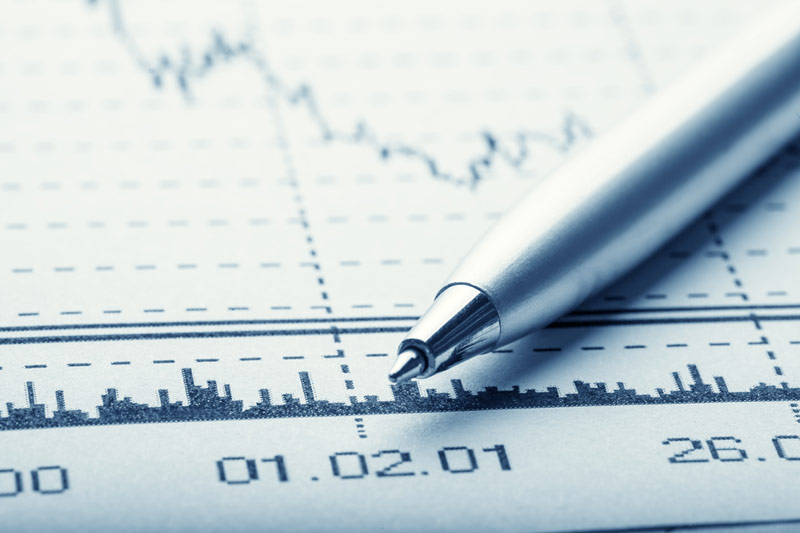
WASHINGTON (Reuters) - Contracts to buy U.S. previously owned homes dropped to a record low in July as higher prices and borrowing costs drove potential buyers from the market.
The National Association of Realtors (NAR) said on Thursday its Pending Home Sales Index, based on signed contracts, fell 5.5% last month to 70.2, the lowest reading since the series started in 2001. Pending home sales fell in all four regions last month. Economists polled by Reuters had forecast contracts, which become sales after a month or two, would rise 0.4%.
Pending home sales plummeted 8.5% on a year-on-year basis in July.
"The positive impact of job growth and higher inventory could not overcome affordability challenges and some degree of wait-and-see related to the upcoming U.S. presidential election," said Lawrence Yun, the NAR's chief economist.
Sales activity is likely to remain subdued. A Conference Board survey on Tuesday showed the share of consumers planning to buy a house over the next six months in August was the smallest since early 2013.
House prices remain elevated, though the pace of increases has slowed. The Federal Housing Finance Agency reported on Tuesday that house prices rose 5.1% on a year-on-year basis in June, the smallest rise in nearly a year, after advancing 5.9% in May.
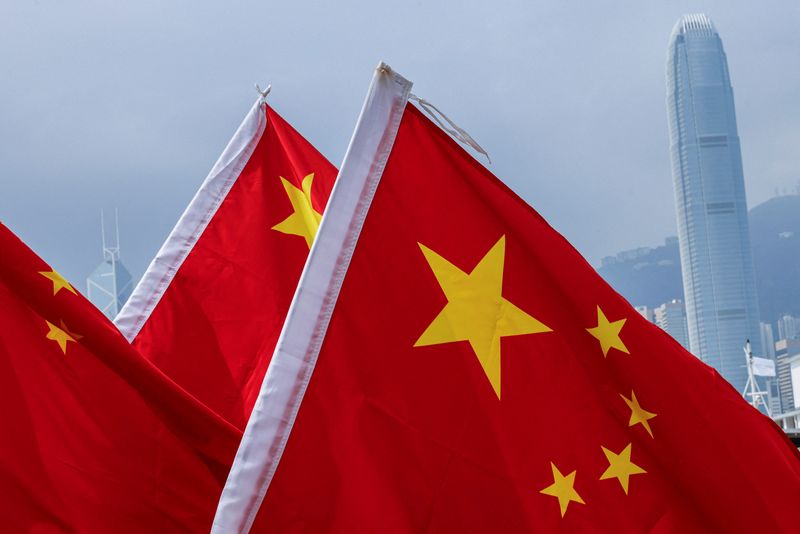
By Duncan Miriri
NAIROBI (Reuters) -Chinese lenders approved loans worth $4.61 billion to Africa last year, marking the first annual increase since 2016, an independent study showed on Thursday.
Africa secured more than $10 billion in loans a year from China between 2012-2018, thanks to President Xi Jinping's Belt and Road Initiative (BRI), but the lending fell precipitously from the start of the COVID-19 pandemic in 2020.
Last year's figure, a more than three-fold increase from 2022, shows China is keen to curb risks associated with highly indebted economies, the study by Boston University's Global Development Policy Centre found.
"Beijing appears to be looking for a more sustainable equilibrium level of lending and experimenting with a (new) strategy," said the university centre, which runs the Chinese Loans to Africa Database project.
The new data comes as Beijing prepares to host African leaders next week for the Forum on China-Africa Cooperation, which takes place every three years.
There were 13 loan deals last year involving eight African countries and two African multilateral lenders, the study found.
Last year's biggest items include a nearly $1 billion loan from China Development Bank to Nigeria for the Kaduna-to-Kano Railway and similar size liquidity facility by the lender to Egypt's central bank.
China has vaulted to the top bilateral lender for many African nations like Ethiopia in recent years.
It has lent the continent a total of $182.28 billion between 2000-2023, the Boston University study found, with the bulk of the finances going to Africa's energy, transport and ICT sectors.
Africa featured prominently in the initial years of BRI, as China sought to recreate the ancient Silk Road and extend its geopolitical and economic influence through a global infrastructure development push.
China, however, started to turn off the cash spigot in 2019, a shift that was accelerated by the pandemic, leaving a series of incomplete projects around the region, including a modern railway meant to link Kenya with its neighbours.
The reduction in loans was caused by China's own domestic pressures and growing debt burdens among African economies. Zambia, Ghana and Ethiopia have gone into protracted debt overhauls since 2021.
More than half of the loans committed last year, or $2.59 billion, were to regional and national lenders, underscoring Beijing's new strategy, the study by Boston University found.
"Chinese lenders' focus on African financial institutions most likely represent a risk mitigation strategy that avoids exposure to African countries' debt challenges," it said.
Nearly a tenth of 2023 loans were for three solar and hydropower energy projects, the study found, illustrating a desire by China to move into funding renewable energy instead of coal-fired power plants.
Still, the discernible trends in last year's figures did not offer a clear direction of China's financial engagement with the continent, the study showed, since Chinese institutions also wrote loans to ailing economies like Nigeria and Angola.
"It remains to be seen whether China's partnerships in Africa will retain their quality," the Global Development Policy Centre said.
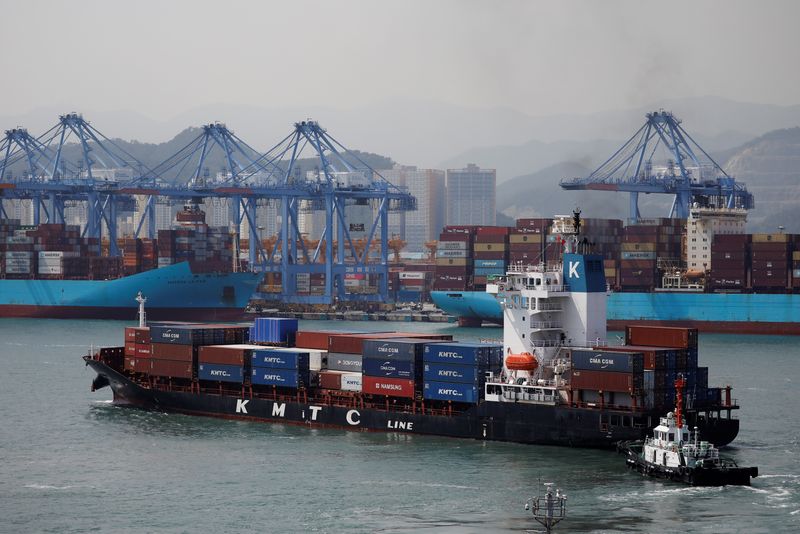
By Jihoon Lee
SEOUL (Reuters) - South Korea's exports are expected to have risen for an 11th straight month in August, a Reuters poll showed on Thursday, with economists noting rising momentum in Chinese demand.
Consumer inflation, meanwhile, is expected to come down to the central bank's medium-term target of 2% for the first time in almost 3-1/2 years, the survey also showed.
Exports in August from Asia's fourth-largest economy are forecast to have risen 13.0% from a year earlier, according to the median estimate of 16 economists in the survey conducted Aug. 23-28.
That would be just a bit smaller than an annual rise of 13.9% in the previous month, which was the strongest since January. The figure suggests demand for South Korean goods remains robust, economists said, citing base effects.
South Korea is the first major exporting economy to report monthly trade figures each month, providing an early glimpse into the state of global demand.
Its exports have been growing since October 2023, led by semiconductors and U.S. shipments on demand related to artificial intelligence.
"Exports of IT products, including semiconductors and computer parts, are continuing to grow at a fast speed, while car sales are also seen swinging back to growth," said Stephen Lee, economist at Meritz Securities.
In the first 20 days of this month, exports jumped 18.5%, with shipments of semiconductors and automobiles climbing 42.5% and 7.9%, respectively. By destination, exports to the United States rose 18.0%, while those to China were up 16.3%.
"Most of all, the recovery in China-bound shipments will lead the export growth in August," said Park Sang-hyun, economist, iM Securities.
The poll also forecast a 6.3% year-on-year rise in imports, slowing from the previous month's gain of 10.5%, which was the fastest since September 2022.
The country's trade balance is expected to post a surplus for the 15th straight month, with the median estimate at $4.67 billion, wider than $3.60 billion in July.
Meanwhile, the monthly survey showed South Korea's annual inflation likely slowed to 2.0% in August, from the rise of 2.6% in July, to mark the weakest since March 2021.
South Korea is scheduled to report trade figures for August on Sunday, Sept. 1, at 9 a.m. (0000 GMT), and inflation data on Sept. 3.
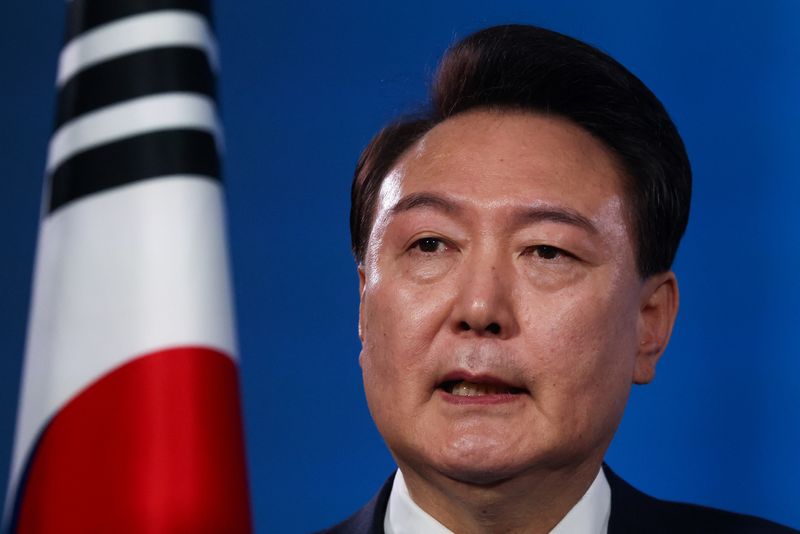
SEOUL (Reuters) - South Korean President Yoon Suk Yeol said on Thursday there was a need to "manage" policy interest rates should expectations about lower borrowing costs lead to further price increases in the country's already hot housing market.
"It won't matter if it (home buying) is real demand, but if speculative demand stemming from asset management purposes boost home prices we will manage policy interest rates. We need to make clear messages on that to calm the overheated sentiment," Yoon said during a televised news conference.
The Bank of Korea (BOK) said at its Aug. 22 meeting that it was time to prepare to cut interest rate cuts after leaving the benchmark rate steady at a 15-year high of 3.50% for the 13th straight meeting, as expected.
Yoon did not elaborate on whether he meant to manage policy interest rates set by the BOK or borrowing costs related to policy financing of local mortgage products.
The BOK's independence to set policy interest rates is guaranteed by law, but governments have a track record of pressuring the seven-memeber board to cooperate over policy direction.
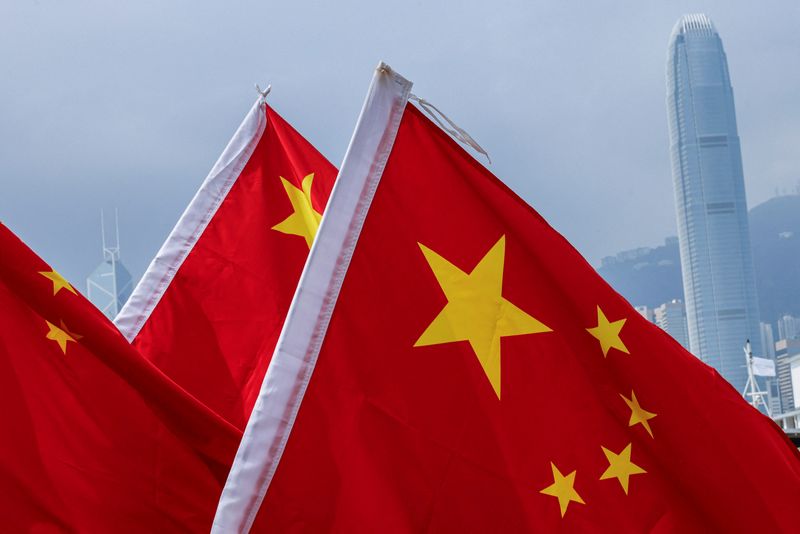
By Duncan Miriri
NAIROBI (Reuters) - Chinese lenders approved loans worth $4.61 billion to Africa last year, marking the first annual increase since 2016, an independent study showed on Thursday.
Africa secured more than $10 billion in loans a year from China between 2012-2018, thanks to President Xi Jinping's Belt and Road Initiative (BRI), but the lending fell precipitously from the start of the COVID-19 pandemic in 2020.
Last year's figure, a more than three-fold increase from 2022, shows China is keen to curb risks associated with highly indebted economies, the study by Boston University's Global Development Policy Centre found.
"Beijing appears to be looking for a more sustainable equilibrium level of lending and experimenting with a (new) strategy," said the university centre, which runs the Chinese Loans to Africa Database project.
Last year's biggest items include a nearly $1 billion loan from China Development Bank to Nigeria for the Kaduna-to-Kano Railway and similar size liquidity facility by the lender to Egypt's central bank.
China has vaulted to the top bilateral lender for many African nations like Ethiopia in recent years.
It has lent the continent a total of $182.28 billion between 2000-2023, the Boston University study found, with the bulk of the finances going to Africa's energy, transport and ICT sectors.
Africa featured prominently in the initial years of BRI, as China sought to recreate the ancient Silk Road and extend its geopolitical and economic influence through a global infrastructure development push.
China, however, started to turn off the cash spigot in 2019, a shift that was accelerated by the pandemic, leaving a series of incomplete projects around the region, including a modern railway meant to link Kenya with its neighbours.
The reduction in loans was caused by China's own domestic pressures and growing debt burdens among African economies. Zambia, Ghana and Ethiopia have gone into protracted debt overhauls since 2021.
More than half of the loans committed last year, or $2.59 billion, were to regional and national lenders, underscoring Beijing's new strategy, the study by Boston University found.
"Chinese lenders' focus on African financial institutions most likely represent a risk mitigation strategy that avoids exposure to African countries' debt challenges," it said.
Nearly a tenth of 2023 loans were for three solar and hydropower energy projects, the study found, illustrating a desire by China to move into funding renewable energy instead of coal-fired power plants.
Still, the discernible trends in last year's figures did not offer a clear direction of China's financial engagement with the continent, the study showed, since Chinese institutions also wrote loans to ailing economies like Nigeria and Angola.
"It remains to be seen whether China's partnerships in Africa will retain their quality," the Global Development Policy Centre said.

MOSCOW (Reuters) - The Russian economy has shown solid growth in many sectors while unemployment remains at a record low, new data showed on Wednesday, prompting officials to hint at a brighter outlook for the year despite Western sanctions over the war in Ukraine.
Driven by military production, industrial output rose by 3.3% in July compared with a 2.7% increase the previous month, and by 4.8% since the start of the year, compared with 3.1% growth in the same period in 2023.
A preliminary estimate for gross domestic product (GDP) growth in the first half of the year stood at 4.6%, compared with 1.8% for the same period last year.
Officials attributed this growth to strong capital investment, including by the private sector, which in the second quarter rose by 8.3% year-on-year to 8.44 trillion roubles ($92 billion), following 14.5% growth in the first quarter of the year.
"Given such high results in the first half of the year, we expect even higher figures for the entire year of 2024 than we had initially projected in the economic forecast published in April," said Polina Kryuchkova, deputy economy minister.
The data suggested the economy was holding up despite Western economic sanctions and problems with international payments with Russia's major trading partners, such as China, which led to a 9% fall in overall imports in the first half of the year.
However, they also pointed to overheating, which forced the central bank to hike its benchmark interest rate by 200 basis points to 18% in July, the highest level in more than two years.
The central bank said persistent labour shortages and wage growth, as well as high inflation, were the main signs of an overheated economy and promised to maintain tight monetary policy and fight inflation until it cools.
New statistics showed that real wages rose 6.2% year-on-year in June, following an 8.8% increase in the previous month, while average nominal wages rose 15.3% year-on-year to 89,145 roubles a month.
Wage growth in Russia is being spurred by the payouts handed to contract soldiers fighting in Ukraine, which have become a new benchmark in the economy as workers in fast-growing sectors facing acute labour shortages demand similar pay from employers.
In the first half of the year, real wages grew by 9.4%, while nominal wages increased by 18.1% compared with the same period in 2023, according to the new data. Unemployment remained at a historically low level of 1.9 million people in July, or 2.4% of the workforce.

By David Shepardson
WASHINGTON (Reuters) -The Biden administration said Tuesday it is awarding $521 million in grants to build out electric vehicle charging and deploying more than 9,200 EV charging ports.
The Energy Department and Federal Highway Administration said $321 million will be allocated for 41 community projects that expand EV charging infrastructure, while $200 million will fund 10 corridor fast-charging projects.
Milwaukee will receive $15 million to install EV chargers at 53 sites while Atlanta will receive $11.8 million to install a DC Fast Charging Hub at the city's airport with 50 DC fast chargers providing charging for rental cars, ride-share drivers, and airport shuttles.
The Biden administration has faced harsh criticism for the slow deployment of EV charging stations from a $5-billion U.S. government program created in 2021.
Automakers and others say drastically expanding EV-charging stations is crucial to the wide deployment of electric vehicles, key to U.S. efforts to reduce greenhouse gas emissions.
The White House goal is to grow the nationwide network of chargers to 500,000 ports, including high-speed chargers - no more than 50 miles (80 km) apart - on the nation's busiest highways.
As of August, the United States had 192,000 public charging ports and since the start of the Biden administration, the number of publicly available fast-charging ports has increased by 90%.
FHWA said approximately 1,000 new public chargers being added each week.
In June, just seven EV-charging stations had been deployed under the 2021 U.S. program consisting of a few dozen total charging ports, said Shailen Bhatt, who heads the Federal Highway Administration.

